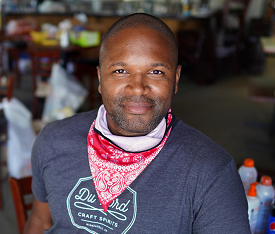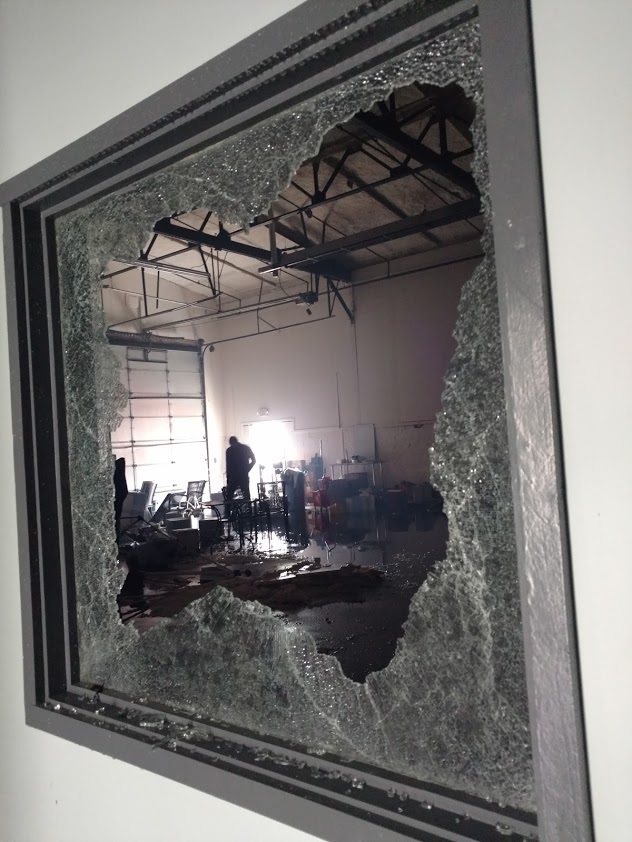US business owners of colour rebuild with resilience after unrest
Small business owners of colour in Minneapolis, Minnesota were hit hard by violence and looting, but many are using the crisis to rebuild in a way that strengthens their communities.

Minneapolis, Minnesota – When civil unrest shook Minneapolis, Minnesota in the United States earlier this year, many residents were horrified – but not all felt the effects directly.
For those who were at home, working remotely because of the coronavirus pandemic, life largely hummed on. But for people who owned businesses along streets hit by looting, their entire lives were upended over a few days – and they are only now beginning to recover.
Keep reading
list of 4 itemsMinnesota judge lifts gag order in George Floyd murder case
Layoffs vs housing: More signs of an unequal US economic recovery
Jobs and other economic gauges signal slowing US recovery
“It’s like a Tale of Two Cities,” Dr Bruce Corrie, a professor of economics at St Paul’s Concordia University, told Al Jazeera. “There are the people who are not so much touched by all of this. Then there are others with not so many choices who are struggling a lot.”
After months of pandemic shutdowns, businesses across Minneapolis were gearing up to reopen when an unarmed Black man, George Floyd, was killed at the hands of a white Minneapolis police officer on May 25, sparking massive protests both city-wide and nationwide.
Over the following days, protesters, journalists and legal observers consistently met violence from police. White supremacists sparked conflict and riots erupted along Minneapolis’s East Lake Street, the major thoroughfare that connects Minneapolis with its twin city, St Paul, via a bridge over the Mississippi River.
Amid the largely peaceful protests, looters took advantage.
In all, nearly 1,500 businesses were damaged, amounting to an estimated $500m in losses across the Twin Cities, according to Minnesota’s governor.
Big corporate stores like Target took a hit. The same fate also befell hundreds of small businesses across Minneapolis and St Paul. Unlike big-box retailers, it was a blow many of them are still struggling to recover from. But it is not just their own livelihoods they are trying to rebuild, but the longer-term financial resilience of the communities they call home.
A decade of progress burned to the ground
Corrie’s research suggests that the 47,000 businesses owned by African Americans, Latinos, Asian and Native Americans in Minnesota account for 27,000 jobs and $700m in annual payroll. As a whole, these communities of colour – also referred to using the acronym ALANA – constitute a $60bn economy in the state.
But those communities, he said, are in a “deep crisis” in the wake of the coronavirus pandemic, the economic downturn it sparked and a summer of civil unrest underpinned by systemic racism.
“Unemployment rates are much higher – almost double – for ALANA communities, especially Black workers, so that’s hit businesses hard,” Corrie said. “The other thing is that we don’t know how many of the jobs that were lost are coming back again.”
The data backs him up: 36.8 percent of Minnesotans of colour applied for unemployment insurance between March 16 and May 30, compared to 19.8 percent of non-Hispanic whites. And while the overall unemployment rate in Minnesota was 7.6 percent in August, Black unemployment stood at 16.3 percent for the same month, “an alarming 10.9 percentage points higher on an over-the-year basis,” according to state data.
The same disparity is reflected nationwide, where the unemployment rate is currently seven percent for white people and 12.1 percent for Black people, according to the Bureau of Labor Statistics.
“Before COVID struck, we were making tremendous progress closing the racial unemployment gap,” Corrie said. “But now, I think we’ve gone back maybe a decade or so.”
Our building was the key business that turned that neighbourhood around. All of that was my baby.
Maya Santamaria, the owner of La Raza, a Spanish-language radio station located on Lake Street, saw a decade of hard work literally go up in flames during protests.
“Our entire building burned down to a crisp,” Santamaria told Al Jazeera.
When Santamaria opened her doors in 2005, violent crime was a major issue on her stretch of Lake Street, part of a city that had been nicknamed, “Murderapolis”. But little by little, small business owners like her changed the landscape.
“Our building was the key business that turned that neighbourhood around,” Santamaria said. “All of that was my baby.”
After four months, Santamaria has finally found a new space that will work as a radio station. She had to outfit it with the necessary equipment to get up and running, a $150,000 project she completed in recent weeks using a combination of insurance money, fundraisers and CARES Act small business relief funds.
“It was months of work. We don’t make money doing that, that’s what insurance companies don’t understand,” she said. “I can’t meet with clients and sell advertising while doing all that.”

MIGIZI, a non-profit focusing on helping Native American youth with educational achievement and work experience, was also damaged during protests.
Nearby, Du Nord Craft Spirits, the first Black-owned microdistillery in the country, also suffered.
“About five fires set off a lot of water damage, but not a single window in the distillery with the ‘Black-owned’ signs was broken,” said owner Chris Montana.
Still, Montana estimates the unrest cost him roughly $200,000 in damage and between $200,000 and $300,000 in lost sales.
Before the riots, he had switched to making hand sanitiser to help combat the coronavirus pandemic instead of the distillery’s usual offering of artisan gin, vodka and other liquors.
“We were really cranking sanitiser out and this slowed us down at a bad time,” Montana said.
As people swept through the neighbourhood, damaging businesses, “We got nervous and sped up getting the ethanol out of our facility in Minneapolis,” Montana said. “The police told us they weren’t going to do anything … I asked what’s your plan? ‘There is no plan. Anyone can do whatever they want’ – that’s a direct quote.”
Before COVID struck, we were making tremendous progress closing the racial unemployment gap. But now I think we’ve gone back maybe a decade or so.

Uncertain winter
Those businesses that have been able to hang on and rebuild have had to adapt to a new reality after the protests and the pandemic.
After using his distillery to distribute hand sanitiser, water and food to those in need as Lake Street burned, Montana has turned his attention to finding long-term strategies for empowering communities of colour.
He received more than $770,000 in donations himself from a GoFundMe campaign, and, in turn, started a foundation to donate money to other businesses that did not have insurance or had clauses in their policies that put the onus of rebuilding on them.

“At this point, the foundation has given out $450,000. We’re holding a bit of money back because we’ll have to start up the food and supply pantry again,” Montana said.
But he also worries about what will happen to restaurants and other businesses that have been serving damaged communities at temporary outdoor locations when the weather starts to get colder.
“The pop-up [relief efforts] are shutting down. What’s going to happen when winter comes?” he said of his plan to start serving meals to people in need again.
Like Du Nord, MIGIZI has also seen an outpouring of support and its president, Kelly Drummer, has also used her newfound platform to help her fellow business owners.
Drummer helped advocate to have the city chip in on the demolition costs for damaged buildings, which can reach up to $300,000. It worked, and Minneapolis agreed to waive demolition and fees and permits for all businesses, instead of making permits contingent on the full payment of their 2020 property taxes.
“It’s just being an advocate. This is wrong. All of us are struggling,” Drummer told Al Jazeera.
While Montana is waiting on his insurance company to decide what’s possible with Du Nord’s location, La Raza and MIGIZI have just recently found new locations so they can get back to work.
“One of our slogans is ‘out of the ashes we will rise,’ and we’ll rise stronger,” Drummer said.